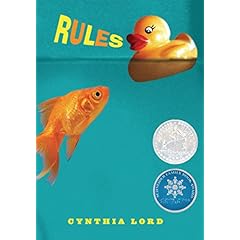 This present tense fad is starting to become annoying. Victory, an historical fiction/fantasy/mystery, is set in two time periods with two main characters. Sam lives in England in the early 1800’s and sails on HMS Victory with Vice-Admiral Lord Nelson. Molly is also British, but unhappily transplanted to the United States as a result of her mother’s marriage to an American. The salinet feature of Molly’s character is that she’s homesick for England. And how do you think the parts of the book that concern Molly’s story are written? That’s right, in third person present tense. I guess it’s supposed to give Molly’s story a sense of present-day immediacy, but I found it distracting.
This present tense fad is starting to become annoying. Victory, an historical fiction/fantasy/mystery, is set in two time periods with two main characters. Sam lives in England in the early 1800’s and sails on HMS Victory with Vice-Admiral Lord Nelson. Molly is also British, but unhappily transplanted to the United States as a result of her mother’s marriage to an American. The salinet feature of Molly’s character is that she’s homesick for England. And how do you think the parts of the book that concern Molly’s story are written? That’s right, in third person present tense. I guess it’s supposed to give Molly’s story a sense of present-day immediacy, but I found it distracting.
Aside from the gimmicky present-tense-for-the-present and past-tense-for-the-past, I thought the Molly parts of the story were mostly unnecessary. Molly’s story and her interest in Lord Nelson did add bit of mystery to the book that would not have been there without the present day tie-in. However, I found the story of Sam Robbins, a ship’s boy on Nelson’s Victory, sufficiently interesting and adventurous. Ms. Cooper weaves the historical details of life on a ship in Her Majesty’s navy in 1803 into the story in a way that gives the facts life. And Sam is a sympathetic character who lives a hard but fascinating life. He makes twenty-first century Molly seem whiny and spoiled.
From the Author’s Note by Susan Cooper: “Sam Robbins’s encounters with Admiral Nelson are not historical; they came out of my imagination, and I loved writing them. Perhaps I wrote this whole book only for the chance of meeting one of my greatest heroes.”
That love of Lord Nelson and the time period in which he lived shines through in the book. The Molly parts just don’t have the same feeling of life and enthusiasm. So I give you permission to skip the chapters that are headed “Molly” and just read about Sam Robbins and the Battle of Trafalgar, if you want. By the way, I really like the cover of the book with the picture of the scrap of a flag. If I were in a bookstore or library, I might pick up the book just because of the cover-appeal.



